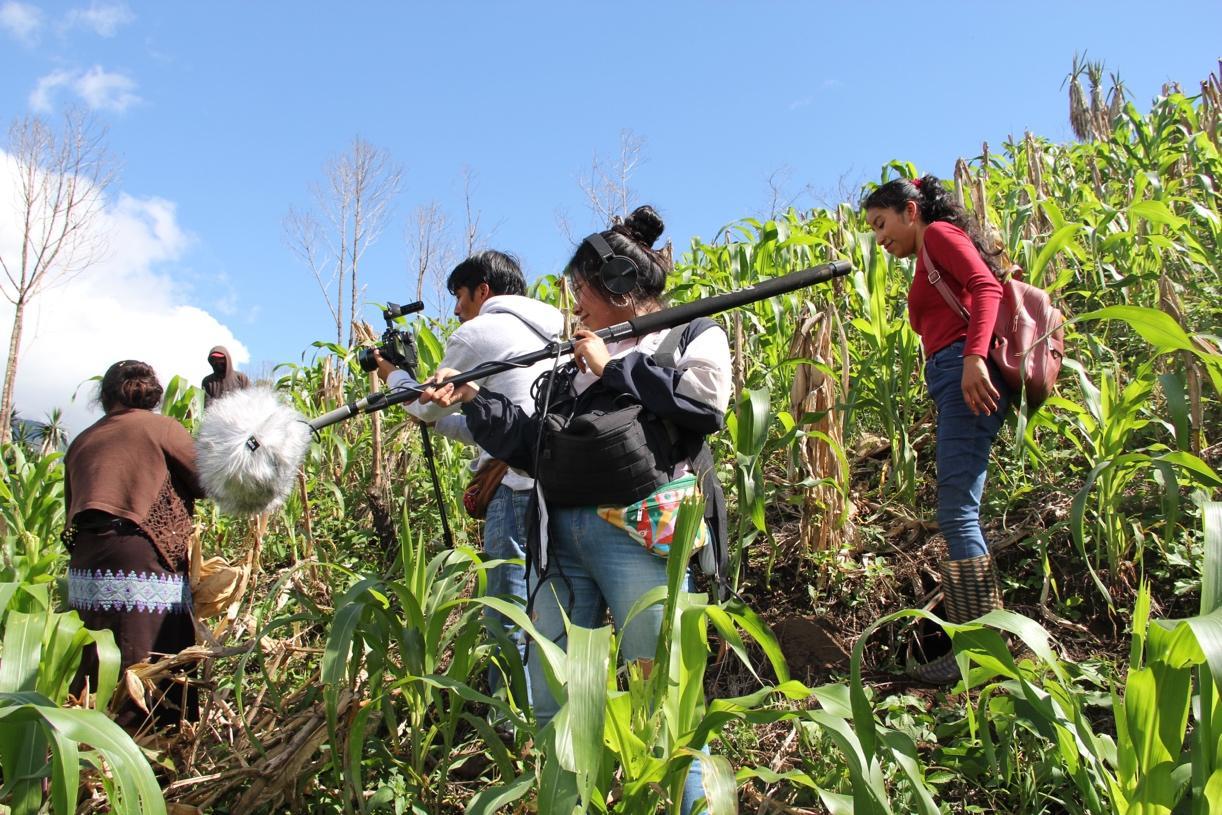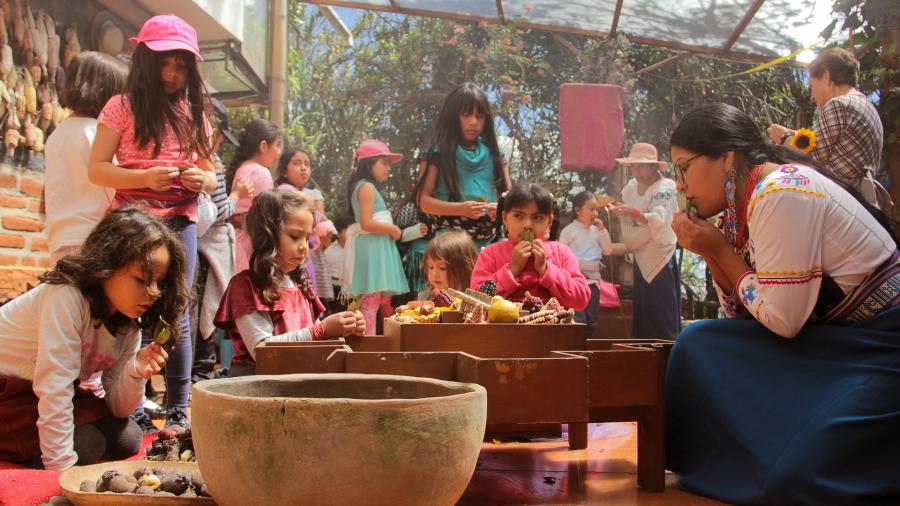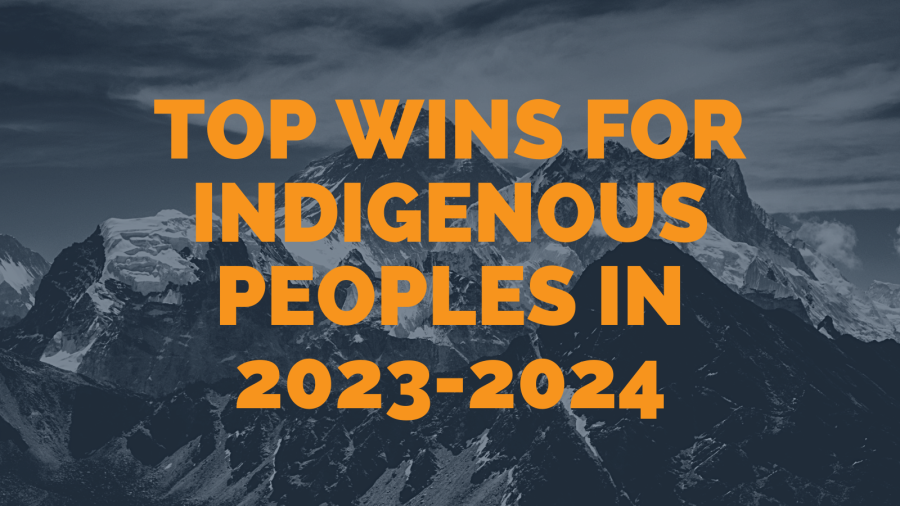
Cultural Survival’s Indigenous Youth Fellowship supports young Indigenous leaders between the ages of 18-28: knowledge holders and creators who, through their leadership and creativity, have the potential to significantly advance their work, leading transformative and impactful spaces within their communities. Since 2018, we have awarded 62 fellowships that supported 82 fellows.
Lissandra Angeli Mukul Canché (Maya), Ana María Vásquez Hernández (Tsotsil), and Juan Gutiérrez Pérez (Maya Tzeltal) were awarded fellowships as part of the 2021 cohort in Mexico. Since then, they have been working to safeguard ancestral knowledge and promote organized collective struggles and the memories of their ancestors. We share with you their three fellowship projects.
Lissandra Angeli Mukul Canché (Maya) from Yucatan, Mexico
Lissandra, 17, is an Indigenous youth leader who is revitalizing the Maya Yucateco language and culture. Her fellowship project, “Mejen Kambalo’ob” (Little Apprentices), supported by Misioneros Asociación Civil, hosted nine communication workshops for 20 children and youth to create radio programs about Maya identity and culture. After several months of sharing community knowledge, the participants produced their pilot radio programs.
Lissandra reminds us that she designed the project to "contribute to the conservation of ancestral knowledge about the milpa and community life that our elders have passed down to us." Milpa is an ancestral agricultural cultivation technique that consists of planting two seeds together (generally corn and another crop, such as beans).
In January 2022, workshop participants shared their likes, aspirations, goals, hopes, and fears. During the first meetings, the participants learned patience, concentration, leadership, and communication skills through playful activities. For example, “in the singing game, we tried to motivate the boys and girls to overcome the struggle of being ‘seen’ in front of an audience. This activity encouraged laughter and fun,” Lissandra says. The participants also played memory games, which allowed them to achieve a goal through a mental strategy.
On the importance of the project, Lissandra says, “The impact of our project can be measured by new generations seeing the knowledge of our grandfathers and grandmothers as a heritage of great value. We can prosper as a community by learning from ancestral wisdom. We want to create a space through which we as youth can motivate children to re-identify with Mayan identity. In this way, they can value growth together with the community.”
Talking with the community about the importance of community life and the milpa was significant. Children and the facilitators visited neighbors and conducted interviews. “The boys and girls completed interviews with support from the facilitators. The workshop participants were happy to participate,” Lissandra says. Conversations about community life also contributed to recognizing ancestral history, values, and culture and were recorded to share further as radio programs.
Lissandra says that she faced a few challenges in implementing the project, such as creating a structure, managing specific technical language, and communicating it adequately. “We could see the difficulty in putting together a radio program. Even managing technical terms was a challenge,” she says. “We adjusted concepts and terms and carried out the activities in a more approachable way. The children were in good spirits and thankful for participating in the project. One participant commented, ‘I liked learning about radio. It is such an experience that I will remember for a long time.’”
Ana María Vásquez Hernández (Tsotsil) from Chiapas, Mexico
Through her camera lens, Ana María Vásquez Hernández (Tsotsil) tells the story of three former Zapatista Tsotsil women who have managed to break down traditional barriers and imposed practices related to gender in her upcoming documentary film, “Snichimal Abtelal” (The Flowers at Work). “My characters are from different generations. However, the violence is constant despite the fact that they know their rights,” says Ana María.
The project seeks to give a voice to courageous Indigenous women breaking cultural and social stereotypes by seeking the right to give or receive an inheritance and the right to work the land with freedom and equality. Confronting machismo and patriarchy, the women tell their stories of how they secured their rights to inherit land, allowing Indigenous women to cultivate and steward it. Ana María says that the biggest reward of this work "is seeing the motivation and strength of the women, especially as they fight for the rights of their children."
Ana María is finishing production on her film thanks to the Fellowship, which enabled her to record missing scenes and finish the first cut. The documentary film was born from the need to uplift campesino women in the Tsotsil community. This project seeks to raise awareness about gender struggles and land rights, highlighting domestic work and other areas where women’s land rights are violated by machismo and traditions.
The documentary shows Indigenous ways of thinking and the traditional patriarchal discourse women have faced for generations. “The documentary was based on three characters and stories that invite the new generations to break the stereotypes imposed by the traditional government system,” Ana María says. “The documentary promotes the use of the Tsotsil language through audiovisuals and shows that women are the living expression of the linguistic and cultural struggle and resistance.” Post-production will take Ana María approximately one year to complete the film.
We invite you to watch a video of the shooting of this documentary:
Juan Gutiérrez Pérez (Maya Tzeltal) from Chiapas, Mexico
Juan Gutiérrez Pérez, 28, is from Chiapas. He is part of the Las Abejas (The Bees) Civil Society, which is a pacifist social movement working to secure Indigenous rights. Las Abejas has been fighting for 30 years for women's rights to land. Initially, the organization was formed by 200 people from 8 communities, all from Ch'enalvo'. Juan’s fellowship project, “Almantal yu´un Lekilal” (Messengers of Peace), documents the history of the social movement in a short film to bring attention to Maya Tzeltal history.
The filmmaking team says that their documentary seeks to show the struggle to defend their territory: “From the testimonies of the interviewees, we were able to understand how our first defenders lived and how they defended Mother Earth. This is the reason for this project: to document the memory of the struggle of Las Abejas de Acteal.”
The documentary short is the result of community effort. “We, as Indigenous Peoples, who live in the community, work daily in the field and spend time with our crops. We took great effort to make this short film about the defense of our Mother Earth. We feel that this is very important to show to our sons and daughters and to people from outside that the land is not a commodity,” the group says. The film includes scenes shot in various territories and from important activities such as the International Women's Day march. In addition, ceremonies, landscapes, and testimonies were documented in the communities of Tzajalchen, Xoyep, and Acteal.
On seeing their work completed, the filmmaking team says, “We are very excited to complete this project. We were able to see the results of our labor. We thank you immensely for your support because the goal we had thought about many years ago has become a reality. We send our greetings and encourage you to keep doing your work. Thank you.”
Cultural Survival supports community communication initiatives. We invite you to watch the documentary here:


